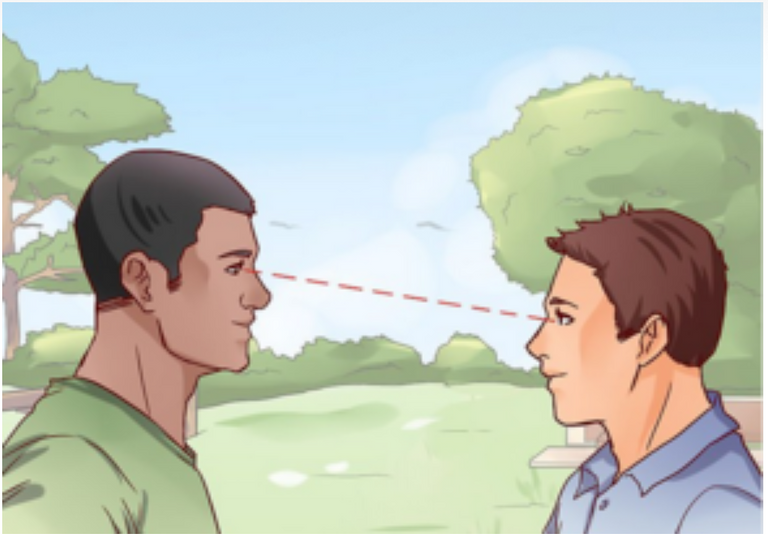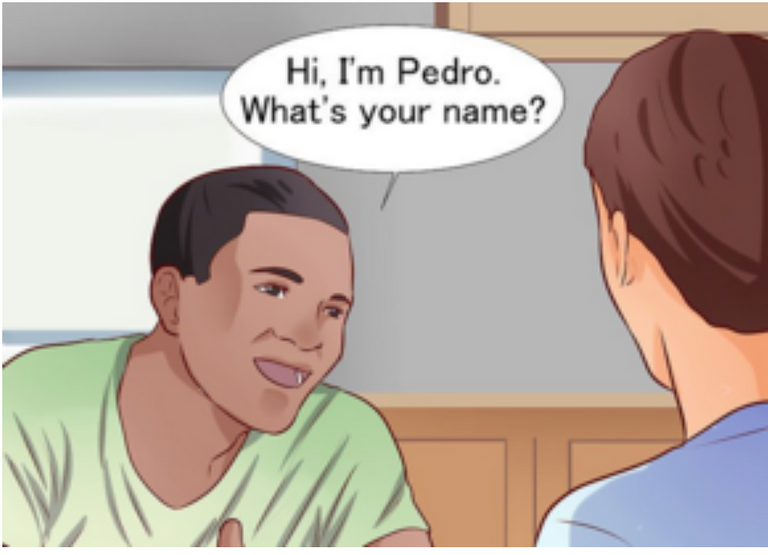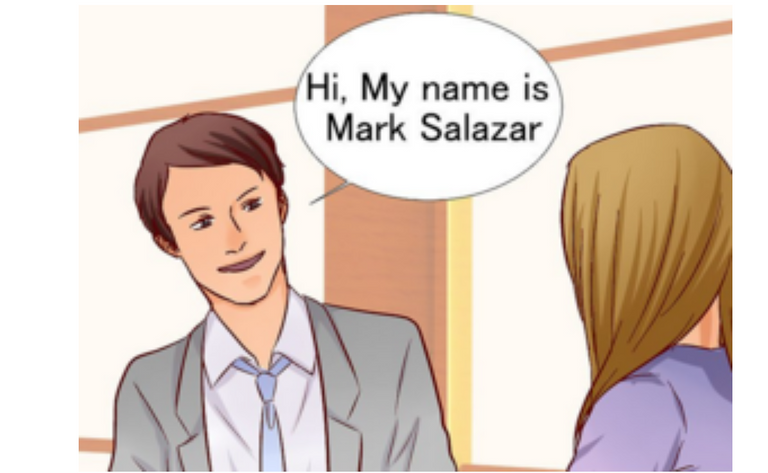1 Introduction
Introducing yourself is much more than saying your name; it’s a way to connect with someone new by exchanging words and often, physical contact. Introducing yourself to strangers can be tricky because what you say depends entirely on the context. You may introduce yourself differently depending on whether you are addressing an audience before you give a speech, meeting someone at a networking event, or just starting a conversation with a new person at a party. What is important is to introduce yourself in a way that is appropriate and makes people like and remember you.
2 Make eye contact
Eye contact shows that you're engaged in the interaction. Eye contact is one way to connect with another human and show that the other person has your attention. When you make eye contact, it shows that you are open and engaged.

If you're not comfortable looking straight into someone's eyes, stare at the point between the eyebrows; she won't notice the difference.
If you’re in a group setting, make periodic eye contact with those around you.
3 Smile
It is important to keep a genuine, bright smile when you meet a new person. Be genuinely happy to meet someone new and to share a positive experience and it will help create a genuine smile. Including the upper part of your face in your smile creates a more genuine and less fabricated smile.

4 Use appropriate body language
Your body language should communicate that you are confident and at ease. Stand with your head high and your back straight, being careful not to slouch. Mirror the body language of people around you. Also mirror the pace of speech and tone of speech of those near you to built rapport.

introduction is formal, say "Hello, I'm [first name][last name]." If it's informal, say "Hi, I'm [first name]. Immediately after you've stated your name, ask for the other person's name by saying "What’s your name?" in a pleasant tone. When you learn the other person's name, repeat it by saying "It's a pleasure to meet you, Pedro" or "Nice to meet you, Caroline."

5 Offered a handshake or other actually approved
Repeating the person’s name will help you remember it, and give the introduction a more personal touch.
Most cultures have a form of physical contact to accompany a greeting. In the United States, it is often a handshake. Be sure to keep the handshake brief and not too loose (floppy) or firm (bone-breaking).

Be aware of cultural differences. For instance, it is considered rude to firmly shake hands in China.[4]
It is often appropriate to greet with a hug, especially if you’re meeting a friend of a friend or an in-law. Hugs show more openness than a handshake. Women more often than men may prefer a hug to a handshake.
In many cultures, it is culturally appropriate to greet with a kiss. In South America, for instance, all women are greeted with one kiss, and in France, women are greeted with one kiss on each cheek. If you are unsure of the appropriate greeting, follow the other person’s lead or watch how other people greet around you.
6 Ask questions
It’s important to show interest in the other person. Ask where she is from, what she does for a living, or ask about any common bonds you may have. Ask about what she loves to do and the passions she has in life. Show that you are engaged and interested in what she has to say.

You may tell a little bit of your background in order to engage conversation and share about yourself. Telling someone where you work or that you love rock climbing is appropriate and may lead to more conversation topics.
Don’t take the opportunity to talk only about yourself. You will come across as selfish or uninteresting .
7 close the conversation
After you've met someone for the first time, you should end the conversation by restating that you enjoyed meeting. If the interaction was formal, say something like "Mrs. Castro, I'm delighted to have met you. I hope we can talk again soon." If your conversation was informal, you can say "It was great meeting you, Harold. Hope to see you around."

8 Greet the aiudience and state your name
If you're giving a speech, it's important to state your first and last name. As you say hello and give your name, remember to speak clearly and confidently.

Say, "Good morning, I’m Chelle Arnold" or "How is everyone doing today? My name is Lisa Carroll".
9 share some relevant information about your...
After you provide your name, share why you and the speech are relevant, making sure you provide your credibility. The sort of information you share will depend on the audience and the subject you'll be talking about. If you're giving a speech about the importance of eating organic foods, tell people that you're a scientist, chef, or environmental professional. If you’re giving a speech about child development, be sure to include that you are a child psychologist.

Provide any other relevant information. For instance, you can provide a brief background of your credible experience. “My name is Erica Lafaurie and I am a professor of environmental science at Berkeley. After I conducted my research in the Amazon rainforest, I realized how important it is to share ways to protect this land.”
10 communicate effectively
From the very start, make sure your voice is loud enough for everyone to hear you. Avoid mumbling by enunciating your consonants crisply. You can even ask the audience if you are speaking loudly enough for all to hear. People will not be able to understand you or respect what you are sharing if they cannot hear you.

11 Move your body
Stand with good posture, and move freely while you speak. Stand up tall, move your shoulders back instead of slouching, and keep your hands free, using them to gesture when necessary. If you don't have to stand behind a podium, then walk around to show the crowd how comfortable you are and to make yourself look less stiff.

12 Say your fullname
Make sure you provide your full name so that the person can remember your name. You can say, "Hi, my name is Mark Salazar," or "Hello, I'm Angela Grace," and they'll be more likely to remember you.

13 Give a one-sentence description of what you do
If you're at a networking event, then it's likely that you'll be talking about what you do to a variety of people. So, what do you say when a new connection asks, "What is it that you do?" Do you launch into a ten-minute story about your career path? Do you reel off a list of your accomplishments in your field? Absolutely not. Unless you're having a more lengthy conversation, you should be prepared to give a one-sentence description of what you do that gives the following information:

Who are you, professionally? Are you a teacher, a project manager, or a health care professional?
Who do you work with? Do you work with children, cross-cultural project teams, or micro-finance organizations?
What do you do? Do you help second-grade children develop their writing skills, do you help cross-cultural teams meet complete their goals while keeping their budgets, or do you help microfinance organizations expand their market base in developing countries?
Now, put your sentence together. State who you are, who you work with, and what you do.
14 Respect people's space
If you have items, don’t place them on recruiter’s or presenter’s tables. Respect their space and don’t overwhelm them. You can also disrupt their materials, such as knocking over a poster or messing up pamphlets. Wait to be asked to exchange business cards, resumes, etc.

15 Follow up with a question
If the person has asked you what you do first, don't just walk away and praise yourself for a job well done. Instead, ask the person what he or she does in return. This is not only polite, but shows that you have a real interest in this person's career path and want to build a meaningful connection.

16 Say good bye like a professional
Don't just wave and say, "Nice meeting you" and walk away from the person. Anyone you meet at a networking event can have the potential to help you in the future, so make sure that you make eye contact, repeat the person's name, and exchange business cards or any other pieces of relevant information before you walk away.

Hi! I am a robot. I just upvoted you! I found similar content that readers might be interested in:
https://www.wikihow.com/Introduce-Yourself
Do read A thumb rule for steemit minnows - 50:100:200:25 for starter tips.
Spend time reading Steem Blue Paper to know how Steem blockchain works and if you still have any queries ask them on our Ask me anything about Steemit post and we will try to answer that.
All the Best!!!
Welcome to Steem @lakshman123.
Welcome to Steem, @lakshman123!
I am a bot coded by the SteemPlus team to help you make the best of your experience on the Steem Blockchain!
SteemPlus is a Chrome, Opera and Firefox extension that adds tons of features on Steemit.
It helps you see the real value of your account, who mentionned you, the value of the votes received, a filtered and sorted feed and much more! All of this in a fast and secure way.
To see why 3162 Steemians use SteemPlus, install our extension, read the documentation or the latest release : SteemPlus 2.18.2 : Post and Support.